牛津版选修8Unit1语法详解
- 格式:doc
- 大小:26.50 KB
- 文档页数:7

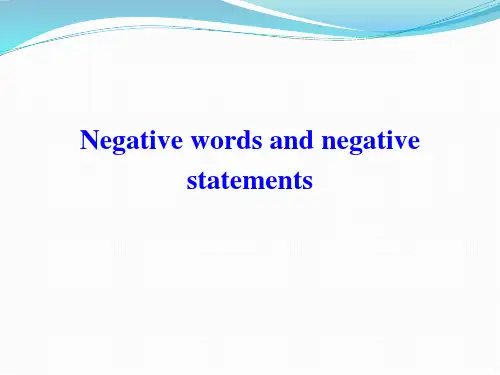
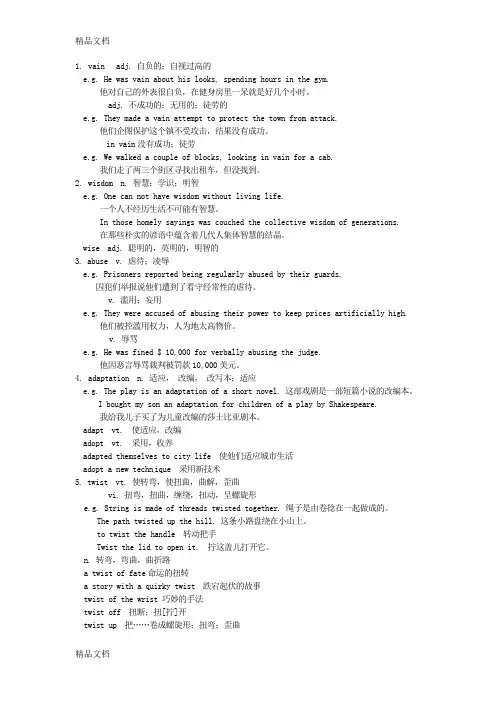
1. vain adj. 自负的;自视过高的e.g. He was vain about his looks, spending hours in the gym.他对自己的外表很自负,在健身房里一呆就是好几个小时。
adj. 不成功的;无用的;徒劳的e.g. They made a vain attempt to protect the town from attack.他们企图保护这个镇不受攻击,结果没有成功。
in vain没有成功;徒劳e.g. We walked a couple of blocks, looking in vain for a cab.我们走了两三个街区寻找出租车,但没找到。
2. wisdom n. 智慧;学识;明智e.g. One can not have wisdom without living life.一个人不经历生活不可能有智慧。
In those homely sayings was couched the collective wisdom of generations.在那些朴实的谚语中蕴含着几代人集体智慧的结晶。
wise adj. 聪明的,英明的,明智的3. abuse v. 虐待;凌辱e.g. Prisoners reported being regularly abused by their guards.囚犯们举报说他们遭到了看守经常性的虐待。
v. 滥用;妄用e.g. They were accused of abusing their power to keep prices artificially high.他们被控滥用权力,人为地太高物价。
v. 辱骂e.g. He was fined $ 10,000 for verbally abusing the judge.他因恶言辱骂裁判被罚款10,000美元。
4. adaptation n. 适应,改编,改写本;适应e.g. The play is an adaptation of a short novel. 这部戏剧是一部短篇小说的改编本。
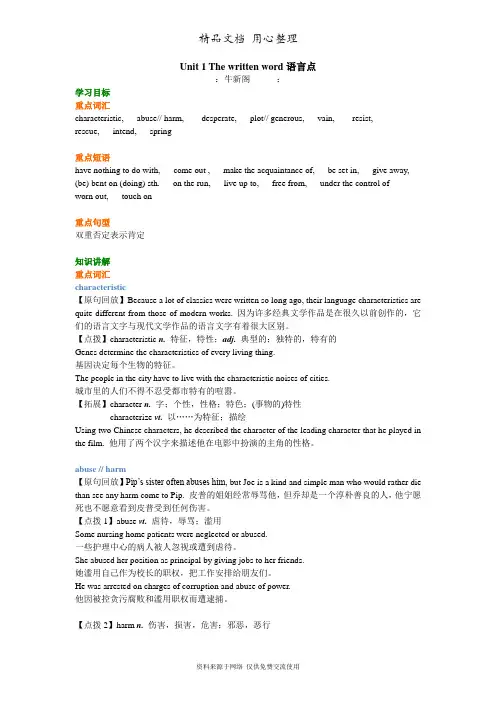
Unit 1 The written word语言点:牛新阁:学习目标重点词汇characteristic, abuse// harm, desperate, plot// generous, vain, resist,rescue, intend, spring重点短语have nothing to do with, come out , make the acquaintance of, be set in, give away, (be) bent on (doing) sth. on the run, live up to, free from, under the control ofworn out, touch on重点句型双重否定表示肯定知识讲解重点词汇characteristic【原句回放】Because a lot of classics were written so long ago, their language characteristics are quite different from those of modern works. 因为许多经典文学作品是在很久以前创作的,它们的语言文字与现代文学作品的语言文字有着很大区别。
【点拨】characteristic n. 特征,特性;adj. 典型的;独特的,特有的Genes determine the characteristics of every living thing.基因决定每个生物的特征。
The people in the city have to live with the characteristic noises of cities.城市里的人们不得不忍受都市特有的喧嚣。
【拓展】character n.字;个性,性格;特色;(事物的)特性characterize vt.以……为特征;描绘Using two Chinese characters, he described the character of the leading character that he played in the film. 他用了两个汉字来描述他在电影中扮演的主角的性格。
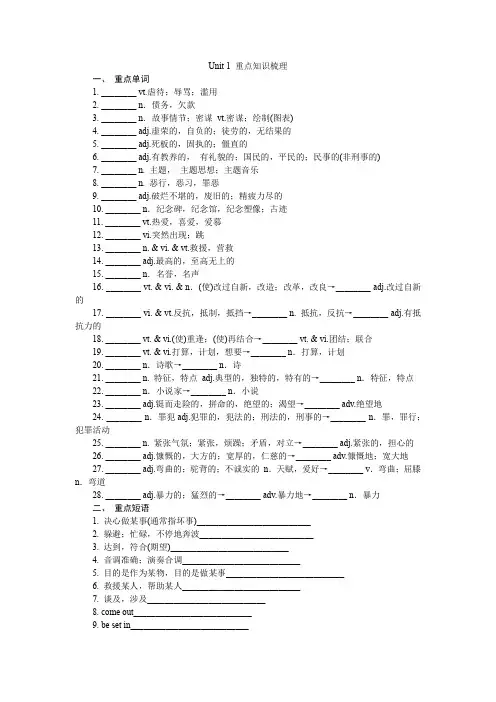
Unit 1 重点知识梳理一、重点单词1. ________ vt.虐待;辱骂;滥用2. ________ n.债务,欠款3. ________ n.故事情节;密谋vt.密谋;绘制(图表)4. ________ adj.虚荣的,自负的;徒劳的,无结果的5. ________ adj.死板的,固执的;僵直的6. ________ adj.有教养的,有礼貌的;国民的,平民的;民事的(非刑事的)7. ________ n. 主题,主题思想;主题音乐8. ________ n. 恶行,恶习,罪恶9. ________ adj.破烂不堪的,废旧的;精疲力尽的10. ________ n.纪念碑,纪念馆,纪念塑像;古迹11. ________ vt.热爱,喜爱,爱慕12. ________ vi.突然出现;跳13. ________ n. & vi. & vt.救援,营救14. ________ adj.最高的,至高无上的15. ________ n.名誉,名声16. ________ vt. & vi. & n.(使)改过自新,改造;改革,改良→________ adj.改过自新的17. ________ vi. & vt.反抗,抵制,抵挡→________ n. 抵抗,反抗→________ adj.有抵抗力的18. ________ vt. & vi.(使)重逢;(使)再结合→________ vt. & vi.团结;联合19. ________ vt. & vi.打算,计划,想要→________ n.打算,计划20. ________ n.诗歌→________ n.诗21. ________ n. 特征,特点adj.典型的,独特的,特有的→________ n.特征,特点22. ________ n.小说家→________ n.小说23. ________ adj.铤而走险的,拼命的,绝望的;渴望→________ adv.绝望地24. ________ n.罪犯adj.犯罪的,犯法的;刑法的,刑事的→________ n.罪,罪行;犯罪活动25. ________ n. 紧张气氛;紧张,烦躁;矛盾,对立→________ adj.紧张的,担心的26. ________ adj.慷慨的,大方的;宽厚的,仁慈的→________ adv.慷慨地;宽大地27. ________ adj.弯曲的;驼背的;不诚实的n.天赋,爱好→________ v.弯曲;屈膝n.弯道28. ________ adj.暴力的;猛烈的→________ adv.暴力地→________ n.暴力二、重点短语1. 决心做某事(通常指坏事)__________________________2. 躲避;忙碌,不停地奔波__________________________3. 达到,符合(期望)___________________________4. 音调准确;演奏合调___________________________5. 目的是作为某物,目的是做某事___________________________6. 救援某人,帮助某人___________________________7. 谈及,涉及___________________________8. come out___________________________9. be set in___________________________10. have a reputation for___________________________11. in honour of___________________________12. have nothing to do with___________________________13. as for___________________________14. have appeal to___________________________15. under the control of___________________________16. get arrested___________________________17. head for___________________________18. spit at sb.___________________________19. let out___________________________20. consist of___________________________三、重点句式根据汉语意思完成句子。
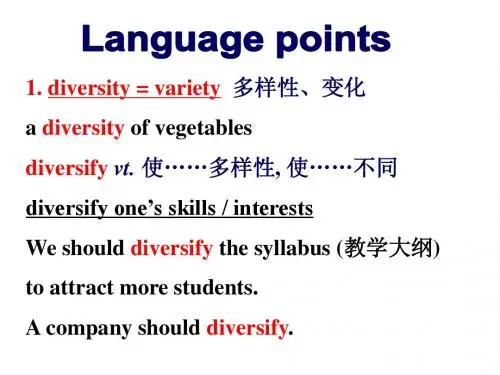

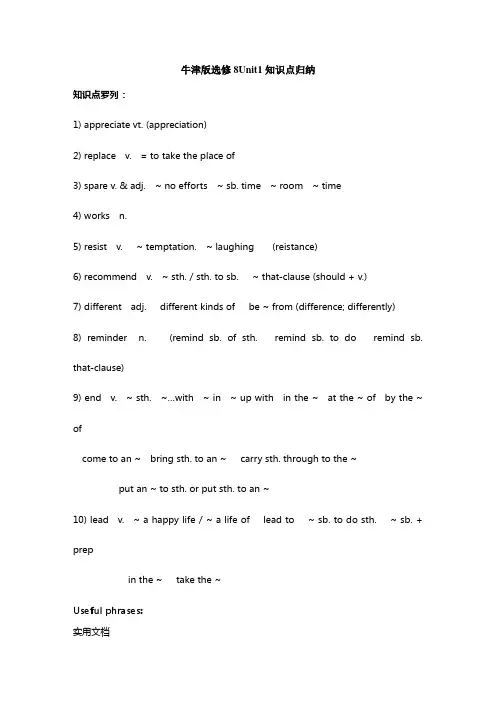
牛津版选修8Unit1知识点归纳知识点罗列:1) appreciate vt. (appreciation)2) replace v. = to take the place of3) spare v. & adj. ~ no efforts ~ sb. time ~ room ~ time4) works n.5) resist v. ~ temptation. ~ laughing (reistance)6) recommend v. ~ sth. / sth. to sb. ~ that-clause (should + v.)7) different adj. different kinds of be ~ from (difference; differently)8) reminder n. (remind sb. of sth. remind sb. to do remind sb. that-clause)9) end v. ~ sth. ~…with ~ in ~ up with in the ~ at the ~ of by the ~ ofcome to an ~ bring sth. to an ~ carry sth. through to the ~put an ~ to sth. or put sth. to an ~10) lead v. ~ a happy life / ~ a life of lead to ~ sb. to do sth. ~ sb. + prepin the ~ take the ~Useful phrases:实用文档1. the antiques of the literary world文学界的遗产2. be left to gather dust尘封不动3. an old –fashioned film过时的电影4. an award-winning film 获奖电影5. best-known works知名著作6. be based on以…为根据7. a place in the world在世界上有一定的地位8. be make into sth制成…9. would rather do sth than do sth宁愿做..而不愿做….10. at a time 一次11. in the early 1800s十九世纪早期12. at one time一度13. on stage在舞台上14. be set in 以…为背景15. set sb free from…把某人从…中解放出来16. add… t o..把…加到…17. have prejudice against sb.对某人有偏见18. add to增添实用文档19. fancy meeting you here!想不到在这儿见到您19. add up to加起来一共20. an educated person一个受良好教育的人21.before long不久22. be bent on doing sth.决心做…22. be seen as…被看成是23. take sb to court把..送上法庭24. be forced to do sth被迫做….25. make sth out of…用…制成…26. serve as充当27. be filled with sorrow满是愧疚28.have a talent for有…才能29. pin sth to sth把…别到…30. get caught被抓住31. have talent for…有…天赋32. at the sight of…一看到33. let out a sad sigh长叹一声34. a deal of 大量实用文档35. encourage sb to do sth.鼓励某人做…36. give away泄露37. a dash of一点儿38. earn one’s living谋生39. shorten one’s life夭折40. at the age of在…岁41. mourn one’s death悼念亡人42. donate … to …把…捐献给…43. the monument to sb. 某人的纪念碑44. tend to do sth有做…的趋势45. be intended to do sth. 是用来做…46. consist of构成Important sentences:1) This makes them difficult for some people to read and the classics are left to gather dust on shelves.2) Pip dislikes it when Joe comes to visit him in London.3) He pities Oliver, takes him home, and tries to reform him.Grammar and Usage:实用文档1. They might not (mightn’t) have been written last year.2. It is not uncommon to find her reading the newspaper.3. I wonder whether /if I shouldn’t bring an umbrella.4. Pip’s sister seldom has a kind word to say.实用文档。
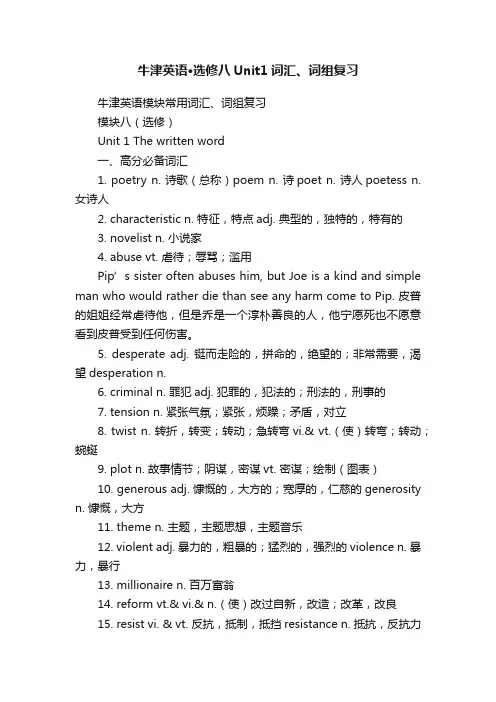
牛津英语·选修八Unit1词汇、词组复习牛津英语模块常用词汇、词组复习模块八(选修)Unit 1 The written word一、高分必备词汇1. poetry n. 诗歌(总称)poem n. 诗poet n. 诗人poetess n. 女诗人2. characteristic n. 特征,特点adj. 典型的,独特的,特有的3. novelist n. 小说家4. abuse vt. 虐待;辱骂;滥用Pip’s sister often abuses him, but Joe is a kind and simple man who would rather die than see any harm come to Pip. 皮普的姐姐经常虐待他,但是乔是一个淳朴善良的人,他宁愿死也不愿意看到皮普受到任何伤害。
5. desperate adj. 铤而走险的,拼命的,绝望的;非常需要,渴望desperation n.6. criminal n. 罪犯adj. 犯罪的,犯法的;刑法的,刑事的7. tension n. 紧张气氛;紧张,烦躁;矛盾,对立8. twist n. 转折,转变;转动;急转弯vi.& vt.(使)转弯;转动;蜿蜒9. plot n. 故事情节;阴谋,密谋vt. 密谋;绘制(图表)10. generous adj. 慷慨的,大方的;宽厚的,仁慈的generosity n. 慷慨,大方11. theme n. 主题,主题思想,主题音乐12. violent adj. 暴力的,粗暴的;猛烈的,强烈的violence n. 暴力,暴行13. millionaire n. 百万富翁14. reform vt.& vi.& n.(使)改过自新,改造;改革,改良15. resist vi. & vt. 反抗,抵制,抵挡resistance n. 抵抗,反抗力resistant adj. 抵抗的,反抗的;顽固的I just can’t resist chocolate. 我就是抵挡不住巧克力的诱惑。
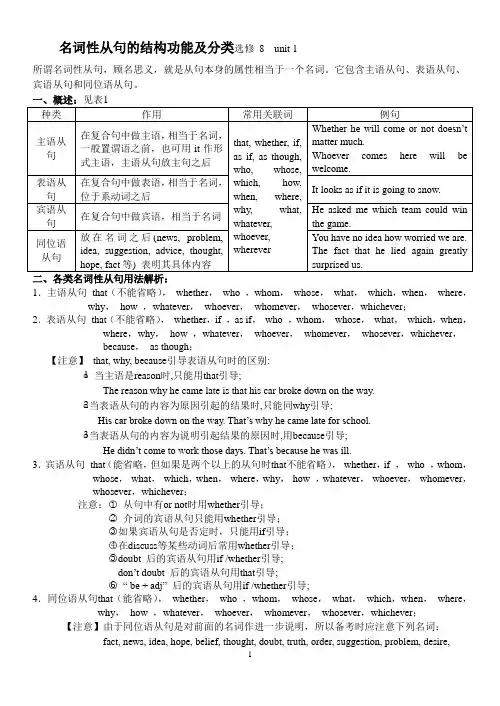
名词性从句的结构功能及分类选修8 unit 1所谓名词性从句,顾名思义,就是从句本身的属性相当于一个名词。
它包含主语从句、表语从句、宾语从句和同位语从句。
二、各类名词性从句用法解析:1.主语从句that(不能省略),whether,who ,whom,whose,what,which,when,where,why,how ,whatever,whoever,whomever,whosever,whichever;2.表语从句that(不能省略),whether,if ,as if,who ,whom,whose,what,which,when,where,why,how ,whatever,whoever,whomever,whosever,whichever,because,as though;【注意】that, why, because引导表语从句时的区别:○1当主语是reason时,只能用that引导;The reason why he came late is that his car broke down on the way.○2当表语从句的内容为原因引起的结果时,只能同why引导;His car broke down on the way. That’s why he came late for school.○3当表语从句的内容为说明引起结果的原因时,用because引导;He didn’t come to work those days. That’s because he was ill.3.宾语从句that(能省略,但如果是两个以上的从句时that不能省略),whether,if ,who ,whom,whose,what,which,when,where,why,how ,whatever,whoever,whomever,whosever,whichever;注意:○1从句中有or not时用whether引导;○2介词的宾语从句只能用whether引导;○3如果宾语从句是否定时,只能用if引导;○4在discuss等某些动词后常用whether引导;○5doubt 后的宾语从句用if /whether引导;don’t doubt 后的宾语从句用that引导;○6― be + adj‖ 后的宾语从句用if /whether引导;4.同位语从句that(能省略),whether,who ,whom,whose,what,which,when,where,why,how ,whatever,whoever,whomever,whosever,whichever;【注意】由于同位语从句是对前面的名词作进一步说明,所以备考时应注意下列名词:fact, news, idea, hope, belief, thought, doubt, truth, order, suggestion, problem, desire,possibility, answer, information, word等。
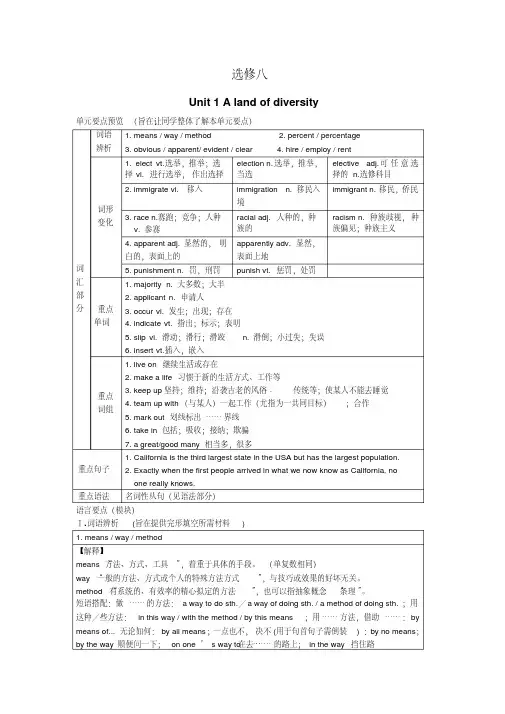
Unit1 The written word【考点透视】I 重点短语receive a letter / a gift ….区分:accept1. receive: receive one’s thanks / receive a good education ….receive the news / a theory / new students….receive sb. at the doorbe generous to do sth.2. generous be generous with sth.n. generosity:show generosity to / towards ….remind sb. of sth.3. remind remind sb. to do sth.remind sb. that ….n. reminder:be a reminder of sth. to sb.settle the date of the meeting / settle the time for….settle to do sth. / that ….settle a problem / the quarrel …4. settle settle in Beijing /settle sb. in / on a chair / settle the cups on the table …settle down / settle down to (doing) sth. / settle on /n. settlement:come to / make / reach a settlementeducate sb. at schooleducate the ear to music / educate the eye to light …5. educate educate sb. to do sth.educated:an educated lady / become more educatedn.:education:obtain / receive / get / have ….educationabuse one’s power / one’s confidence /6. abuse abuse one’s eyesn. abuse of privilegesadj. abusivevt. reform the society / reform sb. / reform oneself7. reform n. advocate / carry out a reform;land reform / the reform of a system …make some reforms in ….feel pity for …have / take pity on ….It is a pity that ….8. pity The pity is that …..What a pity (that ….)!out of pitypity sb. / pity one’s sufferingsresist (doing) sth.resist one’s doing sth.9. resist resist the temptationn. resistance:make / put up resistance to (doing) sth.adj. resistant:be resistant to (doing) sth.10. shorten adj. + en = v. e.g. harden, sharpen, soften ….c.f. n. + en = v. e.g. frighten, strengthen ….mourn the death of sb.mourn sth. = feel sorry for sth.11. mourn mourn for sb.mourn over sth.n. mourning:the mourning for ….vt. exhibit the new products / exhibit some paintings …exhibit a curiosity about sth. / exhibit an interest in ….12. exhibit n. exhibit:e.g. Do not touch the exhibits.n. exhibition:gave / have an exhibition / an art exhibitionan international exhibitionbe under great stress / under the stress of …n. at a time of stress13. stress lay / put stress on (doing) sth.the word stressvt. stress the importance of learning Englishcompare A with Bvt. compare A to B14. compare Compared to / with A, B is ……n. comparison:make an comparison between A and Bthe comparison of A to BII 重点句型1. This makes them difficult for some people to read.2. They have not disappeared and still have a place in the world today.3. England’s greatest writer is lost to the world.4. Great Expectation is set in England in the early 1800s.5. Joe is a kind and simple man, who would rather die than see any harm come to Pip.6. Excited by his move to London, Pip can hardly wait to begin his new life.7. Oliver gets caught by the police and is taken to court.8. Up it flew, higher and higher, until it was a small dot in the sky.【题例精析】【例1】She went to the bookstore and bought _________.(2006北京卷)A. dozen booksB. dozens booksC. dozen of booksD. dozens of books【易错点悟】考查数词。
牛津版选修8Unit1语法详解英语中的否定一、重点讲解I. 否定的种类:否定句是英语中的常用基本句型之一,它用来表示对所表达情况的否认.英语的否定结构形式多种多样,无论在思路上,还是在表达方式上,都与汉语有许多差异.如果只按字面意思翻译,有时会造成误解.因此,在做英译汉和汉译英练习时,一定要认真体会其中的含义,不要望文生义,以防陷入这个可怕的迷宫.按意义分,英语中的否定多种多样.有全部否定、部分否定、多重否定(双重否定).1)全部否定no, not, never, none, nobody, nothing, nowhere, neither... nor,结构均表示强烈意味的完全否定, 在汉语中体现为"绝对不","没有","远不(非)......","一点也不","根本不......","无论如何也没有......"等.2)部分否定英语中一些含有总括含义的代词、形容词或副词,当用于否定句中时,只否定一部分,而不是完全否定.如all, everybody(everyone), everything, anyone(anybody), anything, anywhere, everywhere, always, quite, both, entirely, altogether等词与not连用时,在汉语中译为"......不全是......","不都是......","并非全都是......","不总是......"等,而不是按照字面理解为"所有......都不是".实用文档All that glitters is not gold.闪闪发光的东西不一定都是金子.(误:所有闪闪发光的都不是金子.)All of us don’t want to go.照字面看来好像是“我们大家都不想去”,而实际上是“并非大家都不想去”,即有人想去,有人不想去。
“None of us wants to go” 才是“大家都不想去”因此,“All……not……” 应解释为“一切……并不都……”或“并非一切……都……”。
例如:All knowledge and techniques of modern medicine cannot bring him back to life.即使现代医学的全部知识与技术也不能使他起死回生。
(注:在此解作“即使全部的……也不……”)类似“All……not……”的结构还有“Both……not……” , “Every……not……” ,如:Every instrument here is not good. 这里的仪器并不都很好。
二、英语否定形式1)英语中否定含义的表达形式多种多样,可以用not,no,never,none,nobody,nothing,nowhere等否定词来表达否定之意.2)可以用hardly,scarcely,seldom,little,few等半否定词来表达否定之意.3)可以用含否定意义的前缀a-,ab-,an-,de-,dis-,il-,im-,in-,ir-,non-,un-,under-等构成的词表达否定之意;也可以用后缀-less,-free,-proof等构成的词表达否定之意。
实用文档4)除此以外,还可以用含否定意义的词、词组或句子表达否定意义,现将其作如下归纳:一)、运用含否定意义的词及词组表示否定意义1.动词:absent(缺席,不到),fail(没有),defy(公然反抗),deny(否认),miss (未击中,未赶上),lack(缺乏),escape(被……忘掉),ignore(不顾),refuse(不肯,拒不),negate(否定),decline(拒绝),neglect(忽略),forbid(不许,不准),resist(抗拒)等。
例如:He absented himself from a meeting on some pretext.他借故不去开会。
Her name escaped me for a moment.我一时记不起她的名字了。
2.动词短语:differ from(与……不同),prefer… to(宁愿……而不),keep off(不接近,不让……接近),keep… from/prev ent… from/stop…from/protect… from (阻止,使……不),deprive… of(使丧失),lose sight of(看不见),make light of (轻视,视……不足道)等。
例如:Why should you prevent them from moving into the new house?你们为什么不让他们搬进新居呢?Sickness deprived her of the pleasure of meeting her son.疾病使她不能同儿子欢聚。
实用文档3.名词:absence(不在),failure(没有,不及格),lack(缺乏),(不愿),refusal (不肯),ignorance(无知),negation(否定),shortage(缺乏,不足),want(缺少),zero(乌有)等。
例如:His reluctance to think of a non-sports career caught up with him.他不愿考虑运动员以外的职业给他带来的不幸。
Bass was also in ignorance of his whereabouts.贝斯也不知他的下落。
Shortage of manpower is the chief cause of the delay at the factory.人力不足是该工厂生产停滞的主要原因。
Their hopes were reduced to zero.他们的希望化为乌有。
4.形容词及形容词短语:reluctant(不愿),absent from(不在,没到场),ignorant of(不知,不懂),different from(与……不同),short of(缺少,不足),far from(远非,决不),safe from(免于),free from(不受……影响的,没有……的),free of(无……的)等。
例如:We should be free from arrogance and rashness.我们应该不骄不躁。
5.介词:above(超出……之外),against(反对),beneath(不值得),beyond(超出,无法……),off(离开),past(超过),but/except(除……之外)等。
例如:This problem is beneath notice.这个问题不值得注意。
实用文档The young men of the present day are beyond my comprehension.当代青年我无法理解。
His stupidity is past all belief.他的愚蠢简直不可思议。
6.介词短语:at a loss(不知所措,不知……),in the dark(不知道),in vain(徒劳,无用),out of the question(不可能),off one's guard(毫无防备,没有警惕),out of the swim(不合时髦,不合潮流),at one's wits' end(智穷计尽,不知所措),at the end of one's rope/at the end of one's row(山穷水尽,智穷力竭)等。
例如:The police are at a loss for an explanation of the affair.警察不知如何解释这件事情。
I am completely in the dark concerning his plans.关于他的计划,我全然不知。
I have so much work to do that a holiday for me this year is out of the question.我有这么多工作要做,因此,今年我不可能休假了。
7.其他词组及固定搭配:anything but/by no means/in no case/on no account /under no circumstances(决不),instead of(而不),rather than(而不是),other than(不同于,除……以外),aside from(除了……以外),least of all(最不),the last(极不可能的,最不适合的),let alone/to say nothing/…still less,…(更不用说)等。
例如:实用文档The little bridge is anything but safe.那座小桥决不安全。
The truth is quite other than what you think.事实真相同你想的完全不同。
He can't run a hundred yards,still less a mile.他一百码都跑不了,更不用说一英里了。
二、运用某些结构表达否定意义1.too…to(太……不能)He's too much of a coward to do that.他太怯懦了,干不了那件事。
2.more A than B(与其B不如A)或more than+含有can的从句(不能)He is more brave than wise.他有勇无谋。
My gratitude for your help is more than I can express.对于你给我帮助的感激之情我无法表达。
3.比较级+than+不定式(不至于做)You should know better than to play football in the classroom.你应憧得不该在教室里踢足球。
He was wiser than to have done such a thing.他不至于愚蠢得竟然做出这样的事情。
实用文档三、运用以连词before,unless等引出的状语从句表达否定意义He slipped out before the meeting started.会议还没开始,他就悄悄地溜出去了。